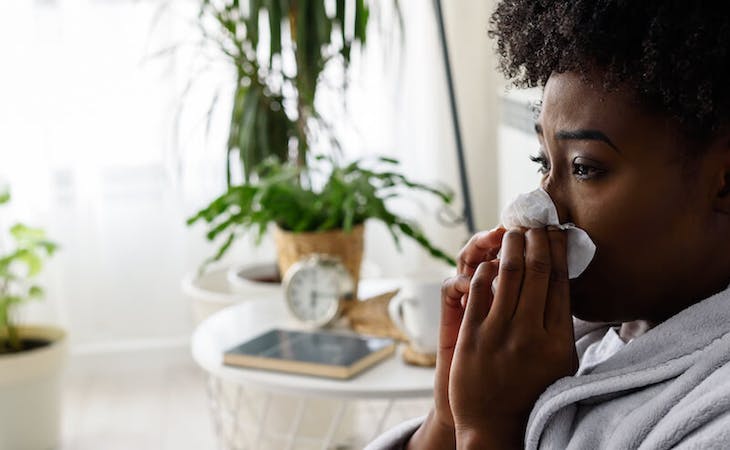Now that colder weather is here—and peak cold and flu season is on its way—it’s only a matter of time before you experience a stuffy nose once again. And with a stuffy nose comes the chance that you’ll struggle to get a good night’s sleep.
But it’s not just a cold or flu that can lead to a stuffy nose at night. There are plenty of other causes that can affect you throughout the year. These include seasonal allergies, chemical irritants used in products like air fresheners and perfumes, and changes in temperature and humidity.
Luckily, there are plenty of solutions. Stacy Mobley, licensed naturopathic doctor, is here to share her very best tips and tricks on how to sleep with a stuffy nose.
How to sleep with a stuffy nose
Here are some easy things you can do to lessen the discomfort of a stuffy nose at night.
Clear your sinuses
Clearing your sinuses before bed can be an extremely effective way to relieve a stuffy nose at night. Mobley says there are two budget-friendly, simple ways to clear those sinuses.
First, she highly recommends a neti pot because you’re “literally rinsing the nasal passageway and sinuses.” A neti pot is a nasal irrigation device that helps clear out mucus and other buildup in your nasal cavity.
If you don’t feel comfortable using a neti pot, Mobley says an old-fashioned steam shower is another good option for clearing the sinuses.
Use a humidifier
Your parents may have put a humidifier in your bedroom when you were little to ease a stuffy nose, and it’s still a helpful tool if you’re dealing with a stuffy nose as an adult.
“A humidifier helps to moisten the air, which relaxes the nasal tissues a bit,” explains Mobley. “It could help to decrease any pain as well.”
She advises keeping the humidifier clean since allergen triggers can collect inside. Change the water often to prevent mold and bacterial growth.
And choose one that works for your budget. “They’re not extremely different, so don’t fall for the idea that the most expensive one is the best,” Mobley says. She adds that either warm or cold mist is fine—the point is simply to add moisture to the air.
Drink tea
Sipping tea before bed is already a relaxing activity, and as it turns out, it can be a great way to relieve a stuffy nose.
Mobley is a fan of peppermint tea. Peppermint has antibacterial and antiviral properties, with research suggesting it may help clear sinuses. Chamomile is another great choice as it has been used for centuries to help ease hay fever and ward off insomnia.
Take a hot shower
As Mobley mentioned, taking a hot shower can be beneficial if you’re trying to clear a stuffy nose before going to sleep.
You can make the shower work even better (and create a luxurious, restful experience) by using aromatherapy. “Hang a little bag of lavender or peppermint right around the showerhead to help add some essential oils to the steam,” she says.
Stay hydrated
Drinking enough water throughout the day has tons of health benefits, but you may not be aware that it can also combat a stuffy nose at night. That’s because staying hydrated helps keep the mucus inside your nose thin and moist.
Mobley suggests upping your intake of water, especially during the wintertime when you’re likely to be more dehydrated due to the cold, dry air. Aim to drink at least half your body weight in ounces per day, says Mobley. So, if you weigh 150 pounds, that’d be at least 75 ounces of water, which works out to a little more than 9 cups.
Take a decongestant
“Decongestants may be taken if they are absolutely needed,” Mobley says, but always ask your doctor before adding a new medication to your routine.
If you know you have something important coming up, like a big exam, work project, or meeting, a decongestant can be a surefire way to clear a stuffy nose and ensure you get the sleep you need beforehand, she adds.
Otherwise, “I would skip it as the body is doing its work,” she says. “Of course, this is up to each individual to do and use at their own discretion and comfort.”
Elevate your head in bed
If you’ve tried everything and you still need some help getting a good night’s rest, Mobley says that elevated pillow placement can help, since it shifts the blood flow down and promotes sinus-clearing. An adjustable base also allows you to raise your head and sleep more comfortably with a cold or stuffy nose.
Is a cough keeping you awake at night? Here’s how to prevent a nighttime cough from ruining your sleep.




